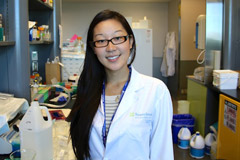A quick study
By Alisa Kim
Nancy Yu didn't speak any English when she immigrated to Canada from China 11 years ago. The fourth-year University of Waterloo student picked it up remarkably well and is now becoming fluent in another language.
"You don't really have these scientific conversations with people in school. It's the first time I've really discussed science in-depth," says Yu of her summer studentship in the lab of Dr. Marc Jeschke, a senior scientist in Biological Sciences at Sunnybrook Research Institute (SRI).
Yu, who is majoring in biomedical sciences, is one of 25 undergraduates in the D+H Summer Student Research Program at SRI.
She says she was drawn to Jeschke's work in burn research and his dual vocations. "The fact that he's a surgeon and a PI [principal investigator]—I knew I wanted to work for him and work here," says Yu.
The Jeschke lab is focused on understanding why mortality rates are substantially higher among the elderly following a burn injury. To tackle this question, the lab is organized into three relevant areas, explains Yu: immunology, metabolism and stem cells. As part of the group studying stem cells, Yu is looking at whether the number of stem cells is lower in the elderly versus younger people, and if this contributes to the skin's decreased capacity to repair itself.
"We're looking for two things: one, to see if the elderly have a decreased stem cell population and why it's decreased. Or, maybe the number is not decreased, but the functionality of those stem cells and their ability to differentiate has decreased. So we're looking at the mechanism and the pure number," she says.
In order to study the mechanisms behind stem cells' functionality, Yu does western blots and immunofluorescent staining, techniques used to detect specific proteins in a biological sample. Prior to joining SRI, she was unfamiliar with these methods. "All those things I learned from scratch," says Yu, who credits the lab's technicians with training her to become proficient in the techniques.
In addition to weekly meetings with all 27 members of the Jeschke lab, Yu has weekly one-on-one meetings with a senior member of the lab who directly oversees her work and that of the lab's seven other summer students. "[Dr. Saeid] is a huge mentor for all of the students. He puts a lot of time helping the students learn," she says.
Yu notes Jeschke's role as a clinician-scientist also affords a rare opportunity to work with human skin in her research. His patients have consented to donating the injured skin he removes during surgery for burn research.
She describes working in the lab as "fast-paced," with lots to be done in her few remaining weeks at SRI. Although her goal is to become a clinician, she says research will always be a part of her professional life. Yu plans to apply to medical school, but says she would love to come back as a research student next summer. "It's been a great experience. I think I told my parents three weeks in, ‘I would totally volunteer for this lab. I don't need to get paid!'"



